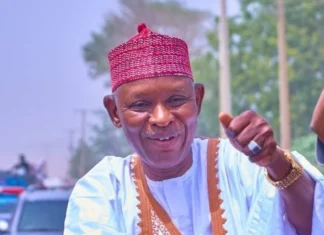Stephen Adewale
Game of Thrones has been running for eight whopping years and on Sunday night, it all came to a (anti-) climactic end, with what was left of the Iron Throne passing on to a new king. At the end, the fans are divided as to whether they loved or hated the show. However, there is a good reason to believe there could have been no other kind of ending, because given that the show is at its heart about civil war and rebellion, it was bound to end in fatigue and fatalism, with no justice served, just as in real life crisis.
Let me quickly note that I have never been a fan of the Game of Thrones. As an undergraduate student in the Department of History at Obafemi Awolowo University when the series premiered on April 17, 2011, I tried to get into it immediately, but the first episodes felt like a combination of violence and porn. With every severed head and gratuitous sex scene, the creators of the show seemed to say: “Forget your history book, that’s how things were in medieval times,” an argument that made no sense. Two years later, while I was undergoing my one-year compulsory national service, a colleague at my place of primary assignment explained to me that the show was not about swords, sex and sorcery. According to him, Game of Thrones operated on two levels: political intrigue on the one hand and horror of wars on the other. His explanation drove me back to the show as I did not want to miss what might later turn out to be a major historical and cultural moment. Six years later, I have seen all the 73 episodes and watched my fair share of the eight seasons.
I disagree with the show on many fronts, especially its depiction of sexual violence against women, but its elaboration of societal issues was not entirely inaccurate. Its assessment of the class issue of political intrigue is an observable reality. The true picture of our society is how the lords in the show turned their cliquey politics and family rivalry into a national policy. Thrones is primarily concerned with the elite of Westeros, a tiny aristocracy unconnected from the only occasionally seen peasantry. Those of humbler origin rarely hold positions of power, and even then, they never rise above the status of adviser or soldier.
Cersei’s exploitation of ethnic and religious differences for her political advantage is a true reflection of the society we live in. Like the lords in the Game of Thrones, we live in the space where the few privileged ruling elites created a political cult based on loyalty to the country’s most powerful figure– President. For this president and his closest associates whom he has imbedded in power, political power is an inheritance that must be dispersed within their selected class; and that integrates exclusive members after they have sworn allegiance of belonging by apparently exercising their loyalty to this club of political elites.
Ours is a society that tolerates regular citizens being crushed under the “wheel” of the noble-house intrigue, smashed like so many of Orson Lannister’s beetles. Like the society we live, what the show lacked was any awareness that everyday common people may have reactions to the events that unfolded. In Westeros, men of power such as Joffrey and Ramsey tortured and killed for pleasure and personal gain. In Essos, oligarchs enslaved vast populations. We were told that the Northern armies would be tired after the Night Walkers and the south to fight Cersei, but they arrived in the south and just went to war without complaint because who wants to think about soldiers as anything other than disposable people. The rest of the Westeros might have had some reaction to Daenerys burning down King’s Landing, but we do not get to see it because little people do not matter. We do not get to see how the Unsullied or the Dothraki react to Jon’s murdering Daenerys because, again, they do not matter. Only the named characters matter, and even then, some of them matter more than others.
Another lesson from the show is the folly of absolute power. Daenerys Targaryen, first of her name, spent many years accumulating power supported by a quirk of biology and magic. At the height of her power, the ruler who thought she was destined to be the Queen of the Seven Kingdoms brought that fact to a horribly literal conclusion by her decision to destroy the King’s Landing, burning noncombatants alive and making sure that many others would be crushed under the toppled blocks of building felled by dragon fire.
There is despair in that fundamental ambiguity. After all, this is what happens when individual leaders accumulate strength that refuses to be questioned or moderated. Everyday people become subject to the workings of the minds, hearts and spleens of the leader in the most intimate ways. The world and its inhabitants are shaped by the powerful’s fickle emotions. There are many scenes in the show that depicted this. For example, the whole horror in the Game of Thrones was ignited because Robert Baratheon, all flesh and fiery synapse, was so deeply in love with Lyanna Stark that he could not imagine or allow himself to believe that she would leave him for Rhaegar Targaryen. Robert warred, he told himself, in the name of love, and bent the fate of the Seven Kingdoms and altered their history as he battled. Of course, our own continent’s history has been shaped in similar ways: by misunderstandings, by insults, by revenge, and by vengeance backed by the weapons of war and the masses are living, still with the consequences.
War brings out the monster in everybody. There are no winners, there are only survivors. To avenge the death of her most trusted ally, Daenerys’ weapons cruise over the homes, businesses, and lives of King’s Landing, toppling towers, and breathing fire. The following scenes, the aftermath of the carnage, are uncomfortably familiar: the rubble, the smoke and the blanket of ashes covering both the dead and the survivors. Conquering soldiers took license to rape and slaughter civilians just as they have throughout the existence of mankind. The Night King couldn’t be reasoned with because he was a kind of monster. Unfortunately, for reasons that remain unclear, Daenerys could not be reasoned with. The illegibility of her motivations is uncannily resonant in itself. Nigerians are living in a moment in which the mood of the notoriously fickle politicians becomes the stuff of breaking news, and in which tyrants and despots around the continent are waiting with their own fiery dragons. The horror at the heart of it all is that the masses keep going through this cycle.
Daenerys claimed she wanted to save the masses but finally accomplishing that mission took the mass death of those exact people. She took it upon herself to make the call on who gets to enjoy their inherent right to existence and whose rights would have to be suspended for the greater good. In this, she became another hierarchical ruler who thought they had inalienable rights to make the call on which other lives matter at all.
The Game of Thrones is a pointer to how lies-based revisionist history has the power to change the future. After all, the show has long been interested in depicting lies as ruptures that can upset the social order. Lies, here, change history. Joffrey, cruel and petty, lied about Mycah’s attack and changed the path of everything that would follow with his selfishness. Cersei lied about joining the Night King alliance, and so much else. Tyrion lied. Littlefinger lied. Arya lied and Ned Stark lied. The lie Ned told led to the establishment of different mistruth that irreparably changed the course of history as it led to the myth that Rhaegar Targaryen had kidnapped Lyanna Stark.
It was a lie that led to rivalries that escalated into wars. The tragedy lurking at the heart of the struggle that is steadily spreading across the Seven Kingdoms was not merely a reflection of how lies can shift reality, but also the idea that simple confusion, solidified as a myth, can do the same. The books on history were wrong. The truths had lied themselves. The show mirrors the society we live in. After all, it is broadcast to the audience living in an environment that is itself constantly shaped by lies. An environment in which leaders mislead with impunity, weaponising lies as an easy means to uneasy ends. The system allows them to do it, because the illusions often suit the powerful’s purposes.
All the surviving noble leaders announce that stories are important to decide who would be king, and that the person who should be king is the one with the most compelling stories. At this point, many began to wonder who would be the lucky one. Would it be Arya who fled her father’s execution, wandered up and down the country with adventures, trained in an exotic land to be a magical assassin, and killed all the zombies? Would it be Sansa, the woman who went to emerge a hardened cynical queen of the North from a fawning child mooning over kings and queens, through a series of dynastic marriages and rapes and abuses?
But it was not to be.
Instead, they picked the most boring, mediocre man in the whole show, the man who spends most of his time staring vacantly into space, who just followed in the wake of all the heroes in the series, and who did nothing but pretended to know everything. A true reminder of our society where our own version of the council of aristocrats who decide who will be king in the country is notorious for imposing on us the most mediocre man they can find.
Daenerys set out with the promise to break the “wheel” of oppression but she failed woefully. In the end, the wheel did not break. The exact same system that led to the whole fiasco was kept in place, with only a temporarily not-awful ruler to keep the system afloat. The first time the council of lords disagrees on who should be the next monarch, or the first time a monarch claims that his offspring deserves to inherit the throne by virtue of being born, everything will basically repeat itself. Logic will not always win. Justice will not always save the day. We can stop the corruption wheel. We can break the tribalism wheel. We can even incinerate the political crisis wheel. But the wheel will find a way to keep spinning as long as it is propelled by selfishness and human folly.
THE FULL VERSION OF THIS ANALYSIS WILL APPEAR IN THE SPECIAL EDITION OF THE JOURNAL OF POPULAR FILM AND TELEVISION










